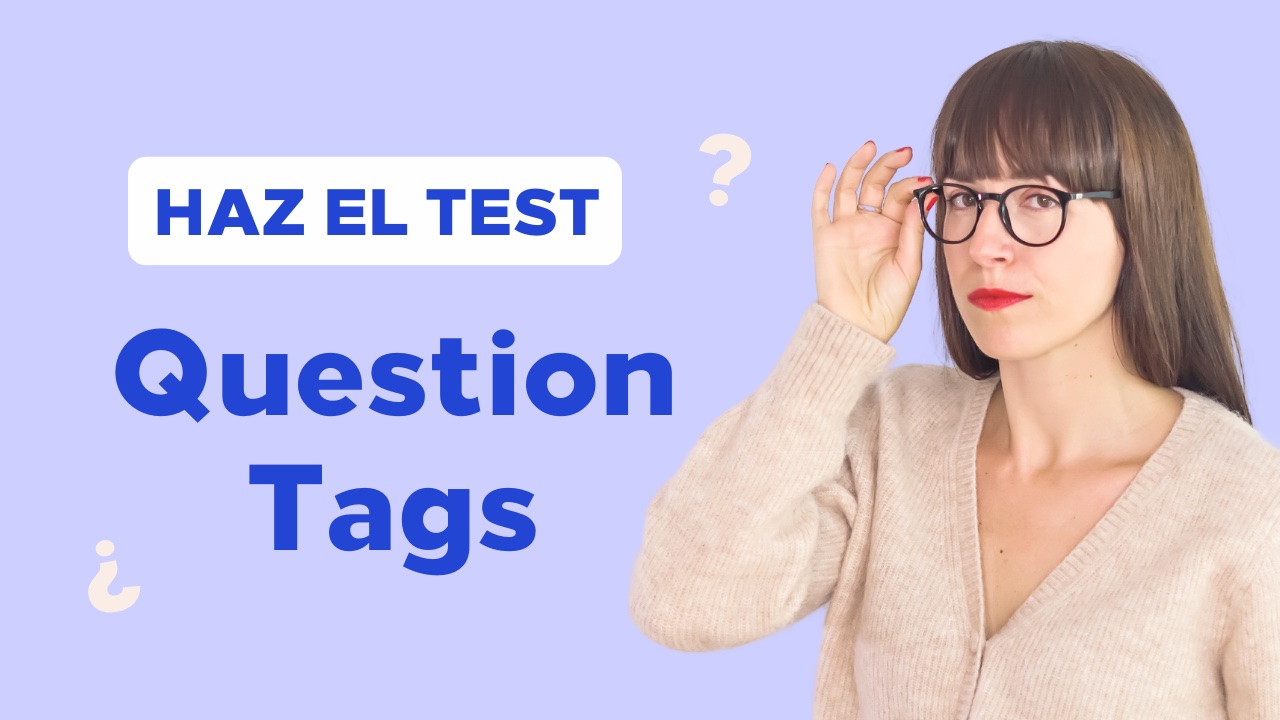
Hello everyone and welcome to another Amigos Ingleses weekly class! En esta clase vamos a aprender a usar las question tags en inglés. It seems like an awesome topic, doesn’t it? ¡Anda, se nos ha colado una question tag y aún no hemos casi empezado! 🙄
Y es que en inglés las question tags aparecen hasta debajo de las piedras. ¡Se usan constantemente! Sin exagerarte, Phillip usa una media de 20 questions tags diarias y eso que no habla tanto como yo, que no me callo ni debajo del agua, jejeje.
Bueno let’s get down to business, shall we? ¡Ayyy, otra más, están por todas partes! En este vídeo vamos a hacer un pequeño examen y si sigues leyendo el post, te explicamos cómo usar las question tags. Are you ready? Pues let’s begiiiiinnnnn!
¿Qué son las question tags?
Son esas preguntas cortitas que se añaden al final de la frase cuando no estamos seguros de cierta información o también cuando hacemos una pregunta retórica.
👉 You don’t drink coffee, do you?
👉 Your cat is so gorgeous, isn’t he?
Equivalen a las coletillas que usamos constantemente en español: ¿no?, ¿verdad? …
Careful my friend! ✋
En inglés no es correcto añadir estas coletilas al final de la frase, por muy bien que nos suene. No escucharás a ningún nativo diciendo:
❌ You’ve been to New York, no?
En su lugar diría:
You’ve been to New York, haven’t you?
¿Cómo se construyen las question tags?
Lo primero es tener en cuenta el sentido de la frase:
Si la frase es positiva, la question tag será negativa.
Si la frase es negativa, la question tag será positiva.
👉 You know how to cook, don’t you?
👉 You don’t know how to cook, do you?
La estructura de la frase será:
VERBO AUXILIAR + PRONOMBRE PERSONAL
A veces podemos ver los verbos auxiliares en la oración principal y otras no. Vamos a ver ambos casos.
👉 El verbo auxiliar APARECE en la oración
Verbo ‘to be’ (present & past continuous)
- He is sleeping, isn’t he?
- You are working this week, aren’t you?
- She was ill last week, wasn’t she?
- They were eating, weren’t they?
Present & past perfect
- You have met my sister, haven’t you?
- She has eaten my cake, hasn’t she?
- You had spoken to Mary, hadn’t you?
Will & modal verbs
- It will be fine, won’t it?
- She won’t tell anybody, will she?
- You can’t take sugar, can you?
- I should study hard, shouldn’t I?
- He must be so sad, musn’t he?
👉 El verbo auxiliar NO APARECE en la oración
Present & past simple
- She runs really fast, doesn’t she? (She does run)
- They live in Belgium, don’t they? (They do live)
- You ate my biscuit, didn’t you? (You did eat)
- It rained last night, didn’t it? (It did rain)
¡Lo que más nos confunde!
Have, have to & have got
- He has a hamster, doesn’t he?
- He has got a hamster, hasn’t he?
- They have to eat, don’t they?
- They have got to eat, haven’t they?
Cuando have got es el verbo de la oración principal, la question tag se forma con have/haven’t o has/hasn’t.
Casos especiales (handle with care) 🔥
Con ‘I am’, siempre se usa la question tag ‘aren’t I?
- I am the best student in the class, aren’t I?
Con el imperativo siempre se usa ‘will you’, tanto si la oración tiene sentido positivo o negativo.
- Pass me that pen, will you?
- Don’t be late, will you?
Con la expresión ‘Let’s’, siempre se usa el question tag ‘shall we’:
- Let’s have lunch, shall we?
- Let’s not argue, shall we?
Con ‘there is’ y ‘there are’, la question tag se forma usando ‘there’ en lugar de un pronombre:
- There isn’t any bread left, is there?
- There is plenty of time, isn’t there?
Si quieres seguir practicando, puedes hacerlo con los tests de:
También tienes aquí nuestros previos posts de esta serie de ‘Test your English’.
✏️ Test de preposiciones de lugar en inglés
You get it now, don’t you? Esperamos que sí, pero si ves que hay algo que no te queda claro, no te vayas a la cama con la duda. Déjanos un comentario y te responderá ‘teacher Bartlett’ a la velocidad de un guepardo (cheetah). 🐆
¡Hasta la semana que viene!
Keep calm & use question tags! 💂♂️✌️




La primera vez que ento en la página y no será la última. Claro, conciso, ameno. Me encanta. Muchas gracias chicos por vuestra ayuda. Sois unos cracks
Thanks Nani! Glad to hear you like our website!
Excellent video and explanation. Another way to review tenses. I really enjoyed it. Thanks.
Excelente vídeo y explicación. Se repasan tiempos verbales a la vez. Realmente me gusto.
Hi, I have an awful doubt concerning question tags 🙂 Yesterday, a friend of mine sent me a picture of a glass of wine he was trying at that moment. I answered and told him: “Delicious, is it?” However, I’m not sure it’s right. Do you use affirmative or negative in that case? Can you also use “right” instead of question tags with the meaning “¿verdad?”?
Thanks a lot.
¡Hola Ester!
Wine is always delicious, isn’t it? Specially with a nice meal 🙂
Como verás, si la frase es positiva, la ‘question tag’ será negativa y viceversa.
Otros ejemplos:
This wine isn’t French, is it?
You like wine, don’t you?
You don’t drink wine, do you?
¡Espero que te ayude!
Happy weekend!😊
Hola, soy nuevo aquí. This is my first comment ever. 🙂
Quick question: Para los modals perfect o perfect continuous, how do you do it? Pones el modal solo en la question tag o tb el have?
For instance:
You should have studied, shouldn’t you? o
You should have studied, shouldn’t you have?
TIA!
Rafa
¡Hola Rafa!
Welcome to our blog! 🙂
Cuando hay un modal verb en la oración principal, usas también ese verbo en la ‘question tag’.
Mira estos ejemplos:
You should have studied harder, shouldn’t you?
You shouldn’t have eaten those greasy biscuits, should you?
He could have told me, couldn’t he?
I wouldn’t have been able to do it without you, would I?
She can’t have got lost, can she?
¡Espero haberte ayudado!
¡Un abrazo!
Hi there! la verdad he usado muchos de ellos en el barco durante el horario de trabajo con los huespedes, los habia oido en peliculas o canciones y gracias a Dios los habia usado bien pero con un conocimiento casi nulo y por imitacion mas que nada, ahora se por que se usan y cuales son las alternativas para usarlos, gracias por esta clase muy instructiva e util para la vida cotidiana. tal vez si tengo una nueva oportunidad de embarcarme pueda hacer un uso mas apropiado y con mayor conocimiento, gracias por la contribucion, se los aprecia mucho!!! un abrazo grande para los dos,
PS: not only in spain people say hello with a kiss, in argentina we also do that and we included a hug if we have not seen each other for a long time, although we only kiss one time, not twice like spanish people.
Hi Felicitas! Me alegro que te hayamos aclarado este tema. Ahora espero que puedas ponerlo en practica en los barcos. You’re very welcome!
😊
Hola muchas gracias por compartir información tan valiosa como esta. Sus explicaciones son muy claras y me estan ayudando para mi examen. Saludos desde Oaxaca, México.
¡Qué bien! Nos alegra mucho poder ayudarte.
¡Un abrazo hasta México! 🙌
“I need to practice so much my english, don´t i?”
thanks teacher phillip and isabel. at least i am reading the theory about Q.T…. but definitibly i need practice so much it.
I should leave a comment, shouldn’t I?. You guys are the most motivating teachers I have ever met in my entire life. Although I have been studying english for a while you’re always live up to my expectations. Thanks for bringing us such a good topics, you’re the dog’s bollocks!
Cheers my darling! Lovely to have you back!
Hi.
That’s my query;
I thought that “kind of” and “sort of” were the same, WEREN’T/AREN’T they?
Which of these is correct?
By the way, I love your videos !!
Hola! Esta clase es de mucha ayuda, y he aprendido mucho gracias Isabel y phillip son maravillosos.
Ohhh lovely! ¡Gracias María!
Isabel,thanks so much for the post.Really thank you! Great.
Gracias Isabel por brindarme este ejercicio.. Estaba buscando un ejercicio como este. Sois los mejores.
Isabel, thanks for the article post.Really thank you! Great.
En los links para seguir practicando habéis puesto el mismo url para English Club y English Grammar por si lo queréis corregir. El de English Club debería ser https://www.englishclub.com/grammar/tag-questions-quiz.htm
Saludos y gracias por vuestro contenido!
Oops! Thanks for letting us know Adrià! I’ve corrected it now. 😉
Hello amigos ingleses!!!!! It was very helpful this video, thanks a lot!!!!
I would like to suggest a video about idioms for me is a little difficult.
See you soon
Buenisimos profess Isabel, ❤ Phillip
Hola Phillip e Isabel, me encanta en tandem que haceís los dos, la idea de los tests me encanta porque muchas veces creemos que tenemos claro un concepto y luego nos confundimos, así de esta manera repasamos y fijamos ideas.
Me permito haceros una sugerencia para un próximo test “direct and Indirect questions”. o una mezcla de todos los tiempos verbales.
Gracias por vuestro esfuerzo
Son muy buenos en lo que hacen les deseo lo mejor de lo mejor
Wow thanks David!
Hello! la verdad tengo la misma duda que Miguel Quinteros, no me queda muy claro porque cuando la frase tiene ‘I am’ tenemos que utilizar ‘aren’t i?’ pero todo lo demas esta muy bien explicado, siento que aprendo mucho mas que en el instituto de ingles al que asisto. Con esto solo me queda seguir practicando. Gracias por su ayuda.
Saludos desde Colombia.
Strange, isn’t it? It’s just another one of those exceptions in English I suppose. Thanks for watching.
Sí es correcto usar ‘amn’t I’. Los irlandeses y escoceses lo usan constantemente. y se acepta como correcto..
Hello!
Hi Teachers!!! Muchisimas gracias por su nuevo video!!! la verdad me ha refrescado la memoria y admito que el (I am the best student,aren’t I) me dejo pensando jajajaj 😀 No puedo esperar para el proximo video..Honestamente no se como hacen para sentirse tan motivados a hacer videos ya mejorar nuestras tardes….Saludos Chicos!!!